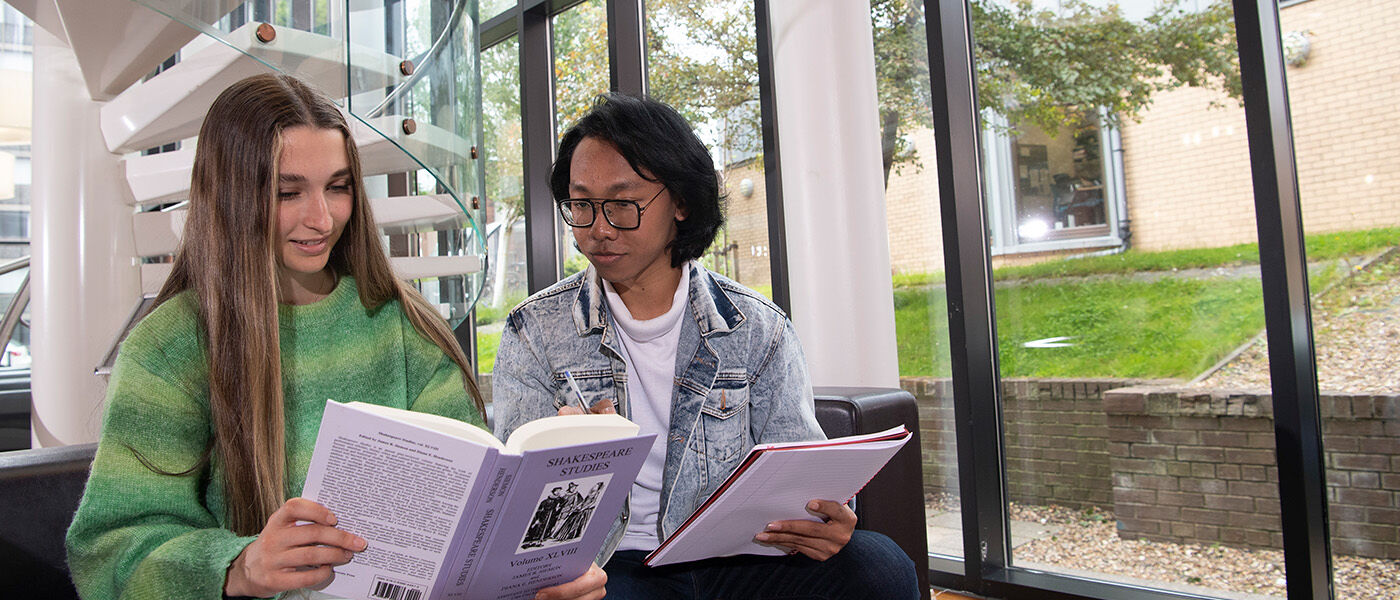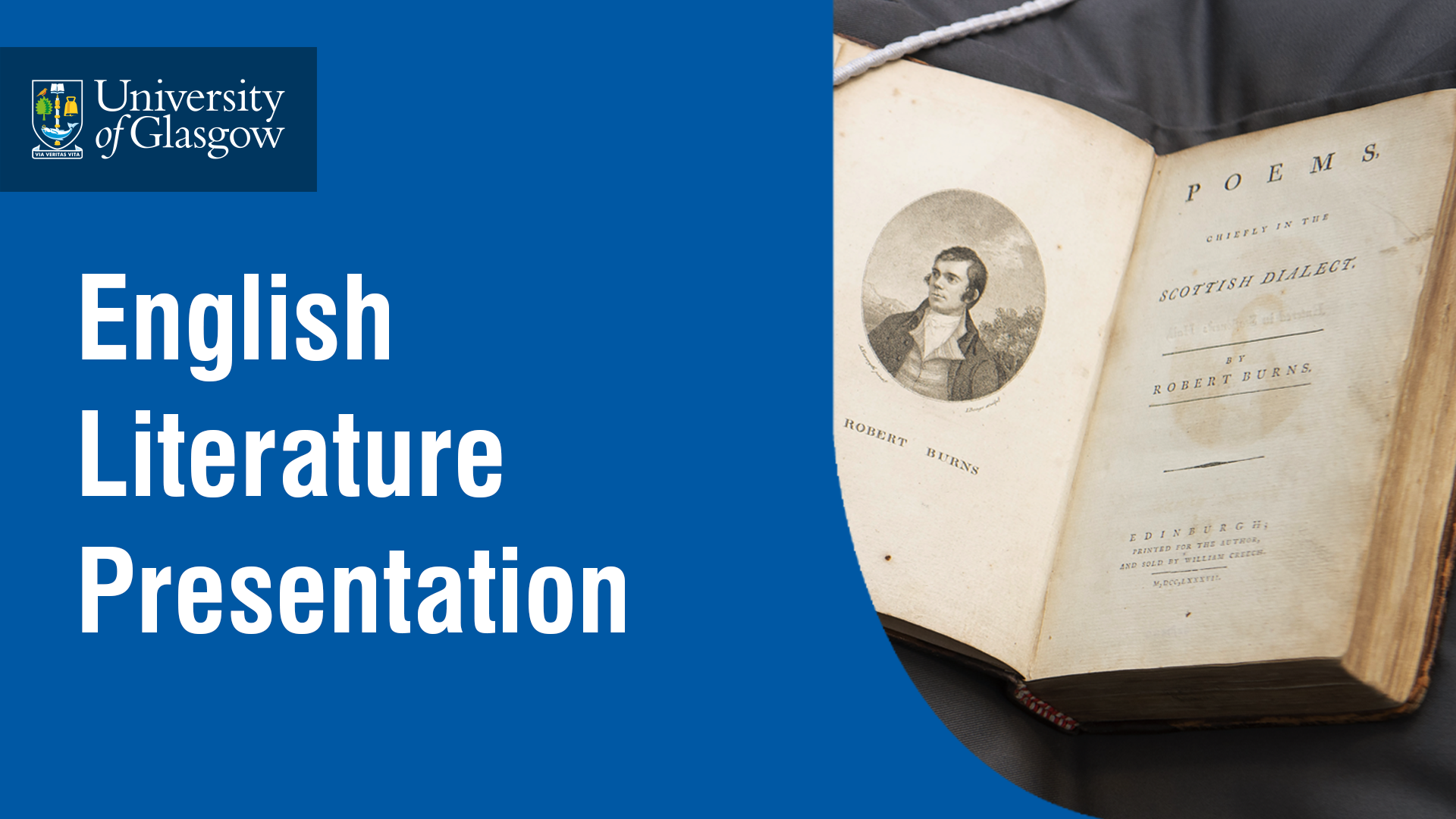English Literature MLitt

Online Panel Discussion and Q&A
Join us for a live online panel discussion and Q&A about this degree on Tuesday 29th April at 2pm
Postgraduate online event:
Thursday 8 May 2025, 9am – 5pm
Chat to staff, students and academics to discover what it's like to study at our world changing campus as a postgraduate student at UofG
This programme gives you the chance to pursue your own interests in English Literature at postgraduate level by selecting from a rich variety of courses led by internationally renowned experts. A core research training course will introduce you to key postgraduate study skills, while a flexible degree structure allows you to select from the full range of optional courses on offer from the School of Critical Studies. You can also add options from elsewhere in the University to construct the course of study that’s right for you. The programme ends with an opportunity to write a dissertation on an English Literature-related topic of your choice. The MLitt English Literature includes courses relating to Glasgow’s significant strengths in Early Modern Studies, Romantic Studies, and Victorian Studies, as well as courses covering the three areas that have specific MLitt pathways dedicated to them (Modernities, American Modern Literature, and Fantasy).
- Academic contact:
- Dr Malica S Willie: Malica.Willie@glasgow.ac.uk
- Dr Jamie Redgate: jamie.redgate@glasgow.ac.uk
- Teaching start: September
- Glasgow: Gilmorehill campus
- MLitt: 12 months full-time; 24 months part‑time
Why this programme
 https://www.youtube.com/watch?v=2dMpKrmZUbI
https://www.youtube.com/watch?v=2dMpKrmZUbI
- The structure of the degree and the wide range of different specialist courses allows you to design a bespoke English Literature MLitt programme; you can focus tightly on a particular historical period or field or range widely to cover a broad range of interests.
- You will have access to world class libraries and museums, as well as the extraordinary diversity of cultural, literary and artistic events that makes Glasgow such a vibrant place for postgraduate study.
- The core research skills programme includes tailored workshops with the University’s archives and world-class Special Collections, as well as providing the academic and technical skills you will need to succeed at postgraduate level in the university and other professional environments.
- Listen to our podcast: Stories from Glasgow – For the Love of Outlander and Stories from Glasgow – Curious Travellers.
Programme structure
The programme is mostly comprised of optional courses, enabling you to tailor your own Masters programme to your area of interest. All students will study our 20-credit core English Literature Research Training Course. You then take five more 20 credit courses and one 60 credit dissertation. The structure for full-time students is as follows:
Semester 1
- Core course: English Literature Research Training Course
- Two optional courses
Semester 2
- Three optional courses
Summer
Courses available change from session to session, but generally we offer at least twenty-five different options in English Literature. A good sense of the subjects we cover can be gleaned from examining the Level 5 options in the course catalogue.
The two semesters of coursework are followed by one term of supervised work towards a dissertation of up to 15,000 words which you will submit at the end of the summer. The topic normally arises out of the work of the previous two semesters, but the choice is very much open to the student’s own initiative. Your supervisor will help you to develop the proposal and plan the most appropriate reading and methodology.
It is also possible to write a dissertation that combines creative writing and a critical component. Normally this possibility is only available to students who have taken the Creative Writing Fiction Workshop (cross-discipline) as one of their options.
Part-time students
Part-time students take the English Literature Research Training Course and three 20 credit courses in their first year of study, and two 20 credit courses and the dissertation in their second year.
Pathways
If you have already identified your area of interest, there are three dedicated pathways through the MLitt in English Literature at Glasgow, in addition to the general programme:
- English Literature: Fantasy [MLitt]
- English Literature: Modernities: Literature, Culture, Theory [MLitt]
- English Literature: American Modern Literature [MLitt]
Each pathway will give you a different mix of core and optional courses.
Programme alteration or discontinuation
The University of Glasgow endeavours
to run all programmes as advertised. In exceptional circumstances, however, the University may withdraw
or alter a programme. For more information, please see: Student contract.
Career prospects
Our MLitt in English Literature provides excellent preparation for PhD study and an academic career. The programme develops key skills sought by many employers, including:
- the ability to find, select and manage large quantities of information
- confident and persuasive oral and written communication
- problem solving through creative and critical thinking.
Graduates have gone on to pursue successful careers in writing, editing, publishing, teaching, the media, heritage and creative industries.
Fees & funding
Tuition fees for 2025-26
MLitt
UK
- Full-time fee: £11250
- Part-time fee: £1250 per 20 credits
International & EU
- Full-time fee: £25320
Deposits
International and EU applicants are required to pay a deposit of £2000 when an offer is made.
Deposits: terms & conditions
Additional fees
- Fee for re-assessment of a dissertation (PGT programme): £370
- Submission of thesis after deadline lapsed: £350
- Registration/exam only fee: £170
Funding opportunities
Alexander and Dixon Scholarship (Bryce Bequest)
College of Arts and Humanities Widening Participation Postgraduate Taught Scholarships
Beatrix Whistler and James McNeill Whistler Scholarship
GREAT Scholarships 2025
The Snowdon Trust Master’s Scholarship
Banco de Mexico
Erasmus+ Master Degree Loans
DAAD-University of Glasgow 1-year Master’s grant
Colfuturo Fundacion para el Futuro de Colombia
Commonwealth Scholarship Schemes
Chevening Scholarship
CONICyT (La Comsion Nacional de Investigacion Cientifica y Tecnologica de Chile)
University of Glasgow African Excellence Award
CONACyT (Consejo Nacional de Ciencia y Tecnologia) / FUNED Agreement
World Changers Glasgow Scholarship
University of Glasgow Caribbean Excellence Award
Postgraduate Student Loan (Scotland and EU)
Postgraduate Tuition Fee Loans England only (PTFL)
Postgraduate Loans for Welsh Students
Alumni Discount
Postgraduate Access Scholarship
Global Leadership Scholarship
Glasgow Excellence Award (UK)
HESPAL Scholarship
Postgraduate Student Loan (NI)
World Changers Glasgow Scholarship PGT (EU)
The Clan Gregor Society Prize
The Dima Alhaj Scholarship
Sanctuary Scholarships
Travel Bursary for Forced Migrants
Glasgow Highland Society Scholarship
The scholarships above are relevant to this programme. For more funding opportunities search the scholarships database
Entry requirements
2.1 Hons (or non-UK equivalent) in English Literature or American or Irish or Scottish or History of Art or Philosophy or any Modern Language or Film and Television Studies or Theatre Studies or any other national Literature or Comparative Literature or any other relevant subject.
Please include a short statement of around 500 words outlining your interest in this programme.
We also require a sample of written work, about 3,000 words in length. This can be a previous piece of work from an undergraduate degree. The work should be written in English. The content does not have to cover a topic related to this specific programme, but the sample should show the potential to engage successfully with postgraduate-level literary studies through demonstrating analytical ability and knowledge of appropriate scholarly methods and conventions.
English language requirements
International students
We are proud of our diverse University community that includes students and staff from more than 140 different countries.
How to apply
To apply for a postgraduate taught degree you must apply online. We cannot accept applications any other way.
Please check you meet the Entry requirements for this programme before you begin your application.
Documents
As part of your online application, you also need to submit the following supporting documents:
- A copy (or copies) of your official degree certificate(s) (if you have already completed your degree)
- A copy (or copies) of your official academic transcript(s), showing full details of subjects studied and grades/marks obtained
- Official English translations of the certificate(s) and transcript(s)
- One reference letter on headed paper
- Evidence of your English language ability (if your first language is not English)
- Any additional documents required for this programme (see Entry requirements for this programme)
- A copy of the photo page of your passport
You have 42 days to submit your application once you begin the process.
You may save and return to your application as many times as you wish to update information, complete sections or upload supporting documents such as your final transcript or your language test.
For more information about submitting documents or other topics related to applying to a postgraduate taught programme, see how to apply for a postgraduate taught degree
Guidance notes for using the online application
These notes are intended to help you complete the online application form accurately; they are also available within the help section of the online application form.
If you experience any difficulties accessing the online application, see Application System Help.
- Name and Date of birth: must appear exactly as they do on your passport. Please take time to check the spelling and lay-out.
- Contact Details: Correspondence address. All contact relevant to your application will be sent to this address including the offer letter(s). If your address changes, please contact us as soon as possible.
- Choice of course: Please select carefully the course you want to study. As your application will be sent to the admissions committee for each course you select it is important to consider at this stage why you are interested in the course and that it is reflected in your application.
- Proposed date of entry: Please state your preferred start date including the month and the year. Taught masters degrees tend to begin in September. Research degrees may start in any month.
- Education and Qualifications: Please complete this section as fully as possible indicating any relevant Higher Education qualifications starting with the most recent. Complete the name of the Institution (s) as it appears on the degree certificate or transcript.
- English Language Proficiency: Please state the date of any English language test taken (or to be taken) and the award date (or expected award date if known).
- Employment and Experience: Please complete this section as fully as possible with all employments relevant to your course. Additional details may be attached in your personal statement/proposal where appropriate.
Reference: Please provide one reference. This should typically be an academic reference but in cases where this is not possible then a reference from a current employer may be accepted instead. Certain programmes, such as the MBA programme, may also accept an employer reference. If you already have a copy of a reference on letter headed paper then please upload this to your application. If you do not already have a reference to upload then please enter your referee’s name and contact details on the online application and we will contact your referee directly.
Application deadlines
September 2025
International & EU applicants
- 25 July 2025
UK applicants
- 22 August 2025



